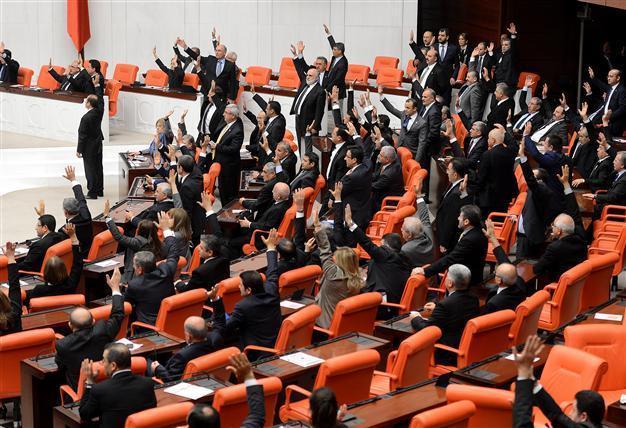Ruling AKP deputies’ parliament motion for inquiry lacks “bribery”
Turan Yılmaz/Bülent Sarıoğlu ANKARA/Hürriyet

The AKP deputies raise their hands against the main opposition CHP’s demand that the summary of proceedings be read in the General Assembly. AA Photo
The ruling Justice and Development Party (AKP) has failed to make any mention of “bribery” in its suggestions for the establishment of an inquiry following a stormy March 19 session on a summary of proceedings for four ex-ministers facing graft charges.Motions submitted by the AKP and main opposition Republican People’s Party (CHP) to the Parliament Speaker’s Office for an inquiry into the four former ministers differ in content and in accusations.
Four motions submitted by the CHP rested on six articles of the Turkish Criminal Code (TCK), while the AKP submitted a single motion asking for an investigation only into two articles under which the lower limit for crimes is a mere suspended sentence.
The CHP’s motion’s premise is “bribery,” while the AKP did not mention “bribery” for any ministers. Moreover, the AKP included the four former ministers’ rights to “right to privacy, freedom of communication and the right against self-incrimination,” derived from the European Convention on Human Rights (ECHR).
The AKP’s motion, delivered by lawmaker Süreyya Sadi Bilgiç and 85 deputies, gives details about appeals from former Economy Minister Zafer Çağlayan, former EU Minister Egemen Bağış, former Interior Minister Muammer Güler and former Urbanization and Environment Planning Minister Erdoğan Bayraktar to be investigated.
Article 255 of TCK, on which the AKP’s motion is based, asks for prison sentence from one to three years for the crime of “taking advantage of unauthorized service.” Article 257 asks for prison sentences of between one and three years for the crime of malpractice. In both cases, the lowest punishment could just be a suspended sentence.
The CHP, in four different motions, demanded investigations on the basis of Article 252 on “bribery,” which could result in prison sentences of between four and 12 years. The CHP also demanded an inquiry into Bayraktar on Article 257, Çağlayan on Article 20 and Güler on Article 204, 255, 285 and 283.
The accusations in the AKP’s motion even fall behind the topics read out at the opening of the extraordinary March 19 session in Parliament.
It is not yet clear whether the motions will be combined.
The motions must be discussed in general assembly and decided on secret vote by April 19, according to the Constitution.
If the motions are approved, then an inquiry commission including nine AKP deputies will be established.
A secret vote of 276 deputies in the general assembly can pave the way for the trial of former ministers at the Supreme Council, the name the Constitutional Court takes when it tries ministers and senior members of the judiciary.
CHP deputy chair Akif Hamzaçebi suggested that the AKP’s motion had already acquitted the ministers of bribery and fabricating a document.
In the extraordinary session in Parliament on March 19, opposition parties demanded that the summary of proceedings be read out in the General Assembly in order to open them to the scrutiny of lawmakers, but Deputy Parliamentary Speaker Sadık Yakut of the AKP refused, arguing that this would compromise judicial confidentiality. The CHP’s motion that demands the summary of proceedings be read in the General Assembly was rejected in a highly controversial 259-158 vote.
The parliamentary speaker cannot compromise judicial confidentiality, and he had to obey the rules, Parliamentary Speaker Cemil Çiçek said, elaborating on opposition lawmakers’ demand for a full reading of the summary of proceedings.
“I have to implement the law here. I don’t have the duty of covering up anyone’s alleged crime,” he said about the controversial decision.
A parliamentary inquiry is not a legislative activity but a juridical inquiry, Çiçek said.
















